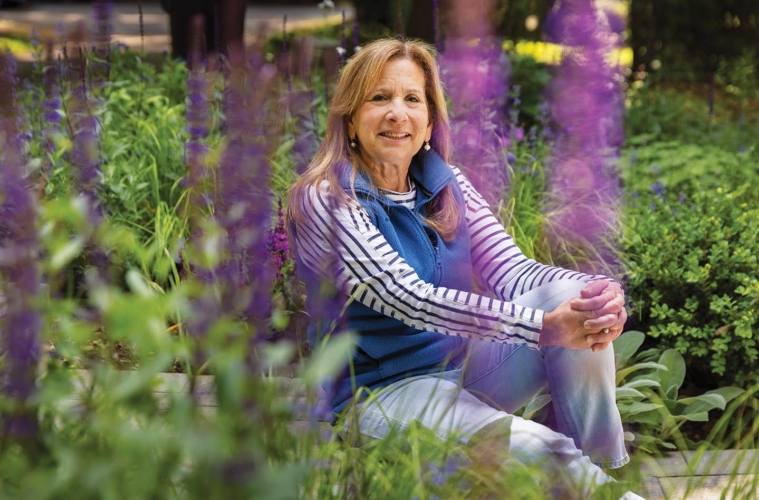Landscape designer Lynn Becker ’78 thinks about climate change as much as aesthetics when she styles gardens for her clients.
In mid-20th-century America, a Jewish saying — tikkun olam — became popular among people interested in social action efforts. The phrase translates to “repairing the world,” and in the 1960s, it was often synonymous with performing social justice actions.
Certified landscape designer Lynn Becker ’78 aims to put the adage into practice through her business, Trout Lily Garden Design. “I’ve taken it to mean [something] more literal: really repairing the world,” she says. “What I explain to my clients is that I can’t [totally] fix how messed up this planet is by myself, but I can do my piece by repairing one garden at a time.”
Becker keeps earth’s longevity at the forefront of her designs through two main principles: modeling her landscape designs around native plants and incorporating pollinator-friendly flora into her clients’ gardens. “Climate change has dramatically altered what we can do” when it comes to planting gardens, she notes. Plants that would’ve survived hot summers decades ago now shrivel and die in the blazing heat, and invasive plants and insects that would have perished in the winter freeze are still kicking come springtime. With this mind, Becker’s mission becomes even more urgent: She keeps on with tikkun olam for the futures of her children and grandchildren.
Becker’s idea to prioritize native gardens isn’t a new concept, but it’s one that has gained traction in recent years. “For a while, native gardens got a bad rap because they weren’t all that attractive,” Becker says. In order for native gardens to be effective, she explains, they have to be beneficial to the environment, designed by knowledgeable designers, and, most importantly, be beautiful.
Native plants, according to the National Wildlife Federation, “have formed symbiotic relationships with native wildlife over thousands of years, and therefore offer the most sustainable habitat.” They also generally require fewer fertilizers and pesticides and less water than non-native plants, remove carbon from the air, and help preserve biodiversity. In Westchester County, where Becker operates, wild bergamot, Northern blue flag iris, and Smooth blue aster are common flowering native plants.
Pollinator gardens often go hand in hand with native gardens by creating a hospitable habitat for beneficial insects such as bees and butterflies. Becker chooses native plants for her clients’ spaces that help wildlife thrive.
Those species fare better than on the neatly manicured, grass-only lawn that became popular in post–World War II America. Becker’s own garden is a testament to this phenomenon: “Last summer during the drought, I’d look out my door in the morning when I got up, and I’d see the butterflies and the bees, and all the insects buzzing, and my neighbors just have lawn and it’s [looking] dead,” she says.
Gardening as a career is Becker’s “second act.” She started out as a lawyer, once working for the New York Mets and later for Simon and Schuster. After stints in legal recruiting, writing for lifestyle magazines, and substitute teaching, Becker took an audit of her career. Her friends spoke about how much they enjoyed their work, and while Becker had good times, she seldom felt emotionally connected to her jobs. One activity she had always found meaningful was gardening.
She’d puttered around in the gardens of her childhood with her father, but “nobody ever told a girl in 1965 that there was a career in gardening,” Becker says. So, after she became an empty nester, she took classes at Westchester Community College, through a program on native plants in conjunction with the Lady Bird Johnson Wildflower Center at the University of Texas at Austin. For the first time, Becker began envisioning gardening not as a hobby, but as her next career. She wanted to be taken seriously.
Becker spent the next five years working through the New York Botanical Garden’s Landscape Design Certificate Program, followed by founding Trout Lily Garden Design. She’s been practicing tikkun olam ever since.
Now 67, Becker sees gardening as her endgame. She takes inspiration from British designer Gertrude Jekyll, who was designing English gardens until her late 80s.
“I can do this for the rest of my life,” Becker says.
The namesake of Becker’s business blooms in early spring. Trout lilies thrive in woodland habitats, providing food for pollinators like bees.

